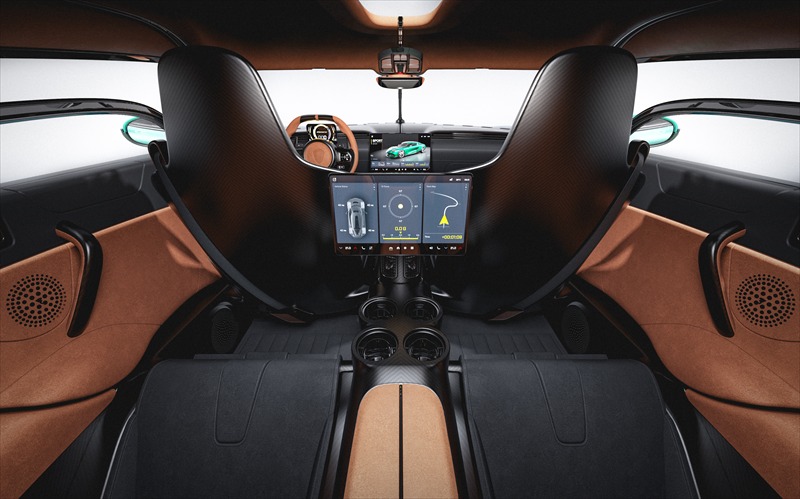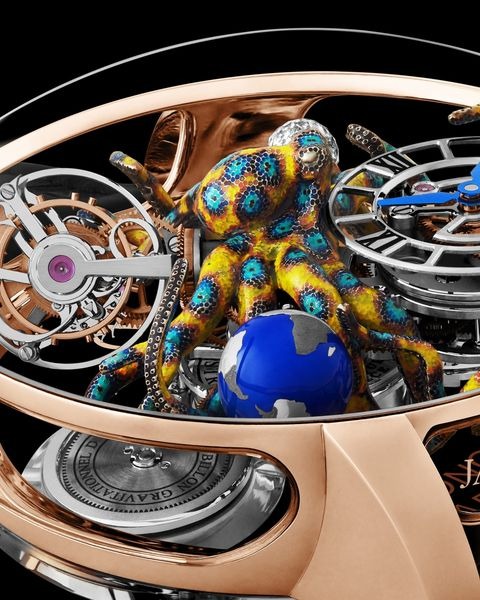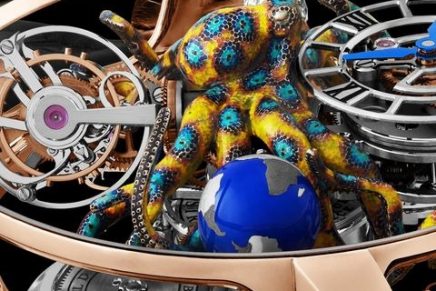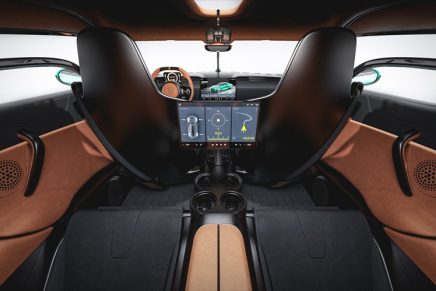A Glimpse into the Extravagance of Tomorrow.
The evolution of luxury is a perpetual journey that intertwines with the fabric of society’s progress. As we embark on a journey into the next 50 years, envisioning the contours of luxury becomes a daring feat of imagination. In a world where innovation is boundless and the unexpected awaits at every turn, what might luxury look like five decades from now?
The Realm of Automation and Artificial Intelligence
Imagine a world where robots cater to our every need, from mundane tasks to complex undertakings. Automation has matured into a seamless companion in our lives, freeing us from the burdens of routine and enabling us to immerse ourselves in what truly matters. Having a robot that caters to our preferences becomes a mark of luxury, while humans channel their energy into creative pursuits.
The Fusion of Man and Machine
A subtle glint of metal beneath the skin is no longer a sci-fi fantasy. In a future where the line between human and machine blurs, the concept of luxury transforms into a harmonious symbiosis. Microchip implants provide instant access to information, wellness monitoring, and connection to a vast digital realm. The sensation of effortlessly summoning knowledge or experiencing virtual worlds through mere thought becomes the ultimate luxury.
The Rise of Experiential Time
In a world where efficiency reigns supreme, the most coveted luxury is not material possessions, but time itself. The wealthy elite invest in technologies that bend time, allowing them to experience years’ worth of adventures in mere weeks. Those who can unlock and manipulate time become the modern-day magicians, offering the priceless gift of extra moments to those willing to pay the price.
Virtual Realities Beyond Imagination
Virtual reality transcends entertainment to become a portal to boundless luxury. Imagine a virtual resort on the rings of Saturn, where attendees feel the chill of space and witness cosmic marvels in person. Virtual reality technologies have evolved to encompass all senses, enabling experiences that defy the constraints of physics. Architects design ethereal palaces that exist solely in the digital realm, accessible only by those with the resources to do so.
The Echoes of Nature in the Concrete Jungle
Amid the futuristic landscapes, a yearning for the natural world persists. Vertical forests rise in megacities, where lush greenery and flowing waterfalls coexist alongside technological marvels. Owning a piece of nature becomes a luxury, as biomes brimming with rare flora and fauna dot the skyline, offering solace and serenity to those who seek respite from the urban sprawl.
A Reimagined Notion of Exclusivity
In an era where abundance is accessible, exclusivity takes on a new dimension. Handcrafted artifacts from centuries past are revered as luxury items, becoming relics of an era when craftsmanship held sway. The act of savoring a handmade delicacy or a vintage bottle of wine harkens back to an age when scarcity was the true luxury, making each encounter a moment of profound appreciation.
As we journey into the future, the canvas of luxury unfurls into realms that test the boundaries of our imagination. In a landscape where technology, nature, and human desire entwine, luxury becomes an ever-shifting mosaic that reflects the essence of our evolving dreams. The next 50 years hold the promise of unparalleled marvels and experiences, where the very notion of luxury expands beyond our wildest aspirations.
In the not-so-distant future, the final frontier may not only be the vast cosmos but the pinnacle of luxury itself. As humanity pushes the boundaries of space exploration, the promise of inhabiting other planets, terraforming distant landscapes, and mining the untapped resources of asteroids tantalizingly beckons. But how might these cosmic endeavors intertwine with the evolution of luxury in the next half-century?
Mars and Beyond: Colonizing the Cosmos
The dream of colonizing Mars and other celestial bodies is no longer confined to science fiction. As space agencies and private companies race to make interplanetary colonization a reality, luxury finds its place in the stars. The elite will undoubtedly be at the forefront of these ventures, transforming the Martian surface into opulent habitats that rival the grandest of terrestrial estates. Mars, once a desolate red landscape, could become a canvas for architectural marvels that fuse cutting-edge technology with extravagant design.
Terraforming for the Privileged Few
Terraforming—a feat of engineering that transforms inhospitable planets into habitable worlds—is poised to be a game-changer in the luxury industry. The elite, armed with unparalleled resources, may have the power to reshape entire planets to suit their desires. A lush, terraformed paradise complete with temperate climates, pristine oceans, and verdant landscapes could become the ultimate exclusive retreat, accessible only to those with the means to wield such transformative power.
Mining the Stars: A New Frontier of Opulence
Asteroid mining, once a far-fetched notion, is now a realistic prospect. Enormous riches lie within these celestial bodies in the form of rare metals and minerals. As the elite stake their claims on these cosmic treasures, the value of these materials could redefine luxury itself. Extraterrestrial jewels, precious metals, and elements that were once scarce on Earth could become commonplace among the privileged few.
The Humanitarian Utopia: A Vision for Global Harmony
As luxury evolves beyond material abundance, the elite may also steer humanity toward resolving some of its most pressing challenges. Imagine a world where ending hunger, pandemics, and ceaseless wars is not just a dream, but a shared mission among the affluent. In this utopian vision, those with power and resources direct their efforts toward eradicating global suffering. Luxury becomes intertwined with a collective mission to uplift humanity, and the status symbol becomes not just opulence but the impact one has on the world.
A Paradigm of Progress and Responsibility
While these futuristic scenarios offer tantalizing glimpses into the possibilities that await, they also pose complex ethical questions. As the elite ascend to new heights of power and influence, the responsibility to wield that influence for the greater good becomes paramount. Luxury could be redefined not just by extravagant excess, but by the impact it has on improving the lives of all.
In the tapestry of the next 50 years, the threads of space exploration, cosmic colonization, and societal transformation weave together to create a vision of luxury that transcends conventional limits. The elite may find themselves at the nexus of ambition and responsibility, guiding humanity toward a new era of opulence defined not just by material wealth, but by the collective progress of a species that dares to reach for the stars.
The Generative AI Revelation: A Path to Swift Solutions and Human Evolution
As luxury journeys into the future, the emergence of generative artificial intelligence promises to reshape the way we approach challenges, from individual concerns to global dilemmas. With the power to swiftly analyze vast amounts of data and generate innovative solutions, AI could serve as a personal concierge for luxury consumers, addressing their needs and desires with unprecedented speed and precision. Moreover, the reach of AI might extend beyond the privileged few, enabling humanity as a whole to harness its potential for finding solutions to our most pressing issues.
A Digital Labyrinth of Connectivity
In a world ever more interconnected, the notion of humanity being accessed online could transcend the realm of science fiction. With the advent of neural interfaces and augmented reality, individuals might find themselves seamlessly connected to the digital realm, fostering unprecedented levels of information exchange and collaboration. The idea of collective consciousness takes on new dimensions as the boundaries between physical and digital existence blur, enabling society to come together swiftly to solve global crises.
Birth Beyond Biology: Artificial Wombs and Evolution
The next 50 years could witness a paradigm shift in how humanity ushers in new life. Artificial wombs, once relegated to speculative fiction, might become a reality, offering an alternative to traditional childbirth. While this innovation presents a futuristic option that could alleviate some of the challenges of pregnancy and childbirth, it also raises profound ethical questions about the nature of human existence, the essence of parenthood, and the potential repercussions of such a transformative shift.
As the convergence of AI, digital connectivity, and biological innovation beckons, luxury consumers and humanity as a whole stand at the crossroads of remarkable opportunities and ethical complexities. With generative AI poised to serve as a compass for innovation, and humanity’s relationship with technology reaching uncharted territories, the coming decades will redefine not only luxury, but the very fabric of what it means to be human.
Cyborg Evolution: Unleashing Human Potential as Valuable Assets
The prospect of becoming a cyborg, a harmonious blend of human and machine, heralds a transformative era where individuals could offer unprecedented value to society. By integrating technology into our bodies, we could overcome biological limitations, enhancing our cognitive abilities, physical prowess, and sensory experiences. As cyborgs, we would become living conduits of innovation, capable of absorbing and adapting to rapid technological advancements with ease.
In a society increasingly shaped by digital landscapes, being a cyborg could confer advantages that extend beyond the ordinary. Enhanced memory, instantaneous access to vast amounts of information, and the ability to communicate seamlessly with machines could make us indispensable contributors to fields such as research, design, and problem-solving. As society grapples with complex challenges, from climate change to medical breakthroughs, cyborgs could wield their enhanced capabilities to drive innovation and find solutions at an unprecedented pace.
Moreover, the versatility of being a cyborg could pave the way for multifaceted contributions. With the ability to seamlessly switch between physical and digital environments, we could bridge gaps between traditional and emerging industries, offering valuable insights that arise from a harmonious fusion of human intuition and machine precision. Cyborgs could represent the vanguard of a new kind of workforce, adaptable to the ever-changing demands of a technologically evolving world.
Yet, while the prospect of becoming a cyborg offers tantalizing advantages, it also raises intricate ethical questions. The balance between retaining our humanity and embracing technological augmentation remains a delicate one. As we step into this future, it will be essential to define the boundaries that safeguard individual rights, privacy, and autonomy, ensuring that the transition to becoming more valuable assets for society is guided by a profound understanding of the implications for both ourselves and the collective.







